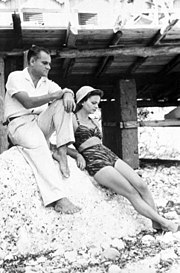Alberto Moravia
Appearance

Alberto Moravia (November 28, 1907 – September 26, 1990), born Alberto Pincherle, was an Italian fiction-writer, screenwriter and essayist. His novels were initially attacked by the Fascist government and placed on the Index by the Catholic church, but later won great critical and popular success.
| This article on an author is a stub. You can help out with Wikiquote by expanding it! |
Quotes
[edit]- Quando non si è sinceri bisogna fingere, a forza di fingere si finisce per credere; questo è il principio di ogni fede.
- When you aren't sincere you need to pretend, and by pretending you end up believing yourself; that's the basic principle of every faith.
- Gli indifferenti (1929; repr. Milano: Corbaccio, 1974) p. 238; Tami Calliope (trans.) The Time of Indifference (South Royalton, Vt.: Steerforth Press, 2000) p. 207.
- Un male incerto provoca inquietudine, perché, in fondo, si spera fino all'ultimo che non sia vero; ma un male sicuro, invece, infonde per qualche tempo una squallida tranquillità.
- An uncertain evil causes anxiety because, at the bottom of one's heart, one goes on hoping till the last moment that it may not be true; a certain evil, on the other hand, instills, for a time, a kind of dreary tranquillity.
- Il Disprezzo (Milano: Bompiani, 1954) p. 77; Angus Davidson (trans.) Contempt (New York: New York Review of Books, 2005) p. 75.
- Good writers are monotonous, like good composers. They keep trying to perfect the one problem they were born to understand.
- In principio, dunque, era la noia, volgarmente chiamata caos. Iddio, annoiandosi della noia, creò la terra, il cielo, l'acqua, gli animali, le piante, Adamo ed Èva; i quali ultimi, annoiandosi a loro volta in paradiso, mangiarono il frutto proibito. Iddio si annoiò di loro e li cacciò dall'Eden.
- In the beginning was boredom, commonly called chaos. God, bored with boredom, created the earth, the sky, the waters, the animals, the plants, Adam and Eve; and the latter, bored in their turn in paradise, ate the forbidden fruit. God became bored with them and drove them out of Eden.
- La noia (Milano: Bompiani, 1960) pp. 10-11; Angus Davidson (trans.) Boredom (New York: New York Review of Books, 1999) p. 8.
A GHOST AT NOON Alberto Moravia
. Love has great capacity not only for illusion but also for forgetfulness. p29.
. The truth is that one easily forgets what one does not want to remember. p29.
Quotes about
[edit]- We were good friends. The news of his recent death hit me hard. I still feel the pain of his loss. And of course I remember how I responded to his early writing. When I was very young Gli Indifferenti was of crucial importance as I formed my first views about writing. I’d have to say that for me Moravia’s earlier work was also his strongest. I love the work up to and including Roman Stories. I think he thought they were perhaps too popular, too much in the mode of a sort of national narrative. Whereas for me the stories in this collection are extraordinary. He managed in that book to depersonalize himself in a masterful way...by that I mean that he recreated himself in the form of many different characters in such a convincing way. His gift for getting inside the personality of characters so totally different from himself was truly remarkable. This was a gift comparable to that of Maupassant, a writer who managed to get inside many diverse characters at a time, so as to paint a complete fresco of the France of his period, of the life of the peasants, of the servants, of the city and of the provinces. He was a really great writer who is absolutely forgotten now. I would like somehow to bring him back. (PG: Is his work translated into Italian?) NG: Yes, but now it is totally ignored. There is a work of his which I particularly love, a novel called A Life, which I’m in the process of translating now.
- Natalia Ginzburg Interview (1992)

